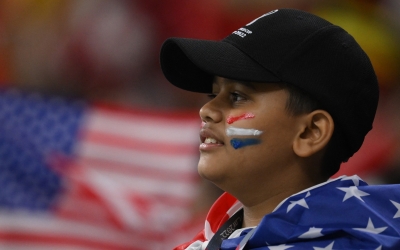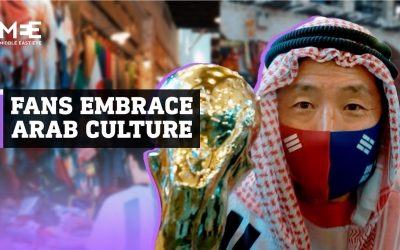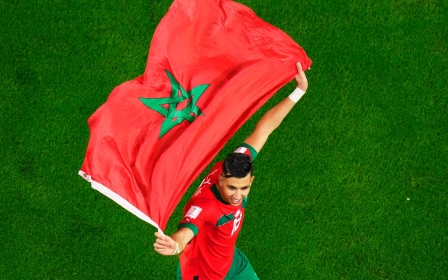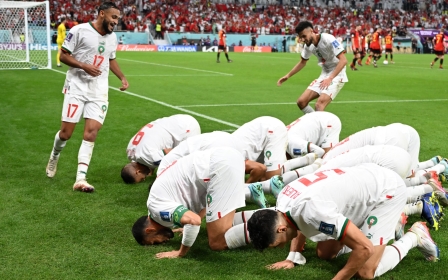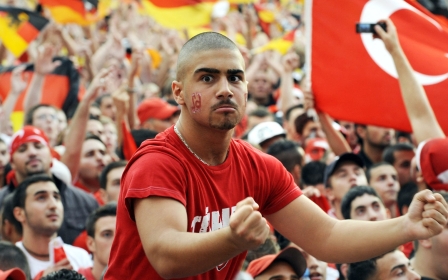World Cup 2022: Why do some British Muslims find it difficult to support England?
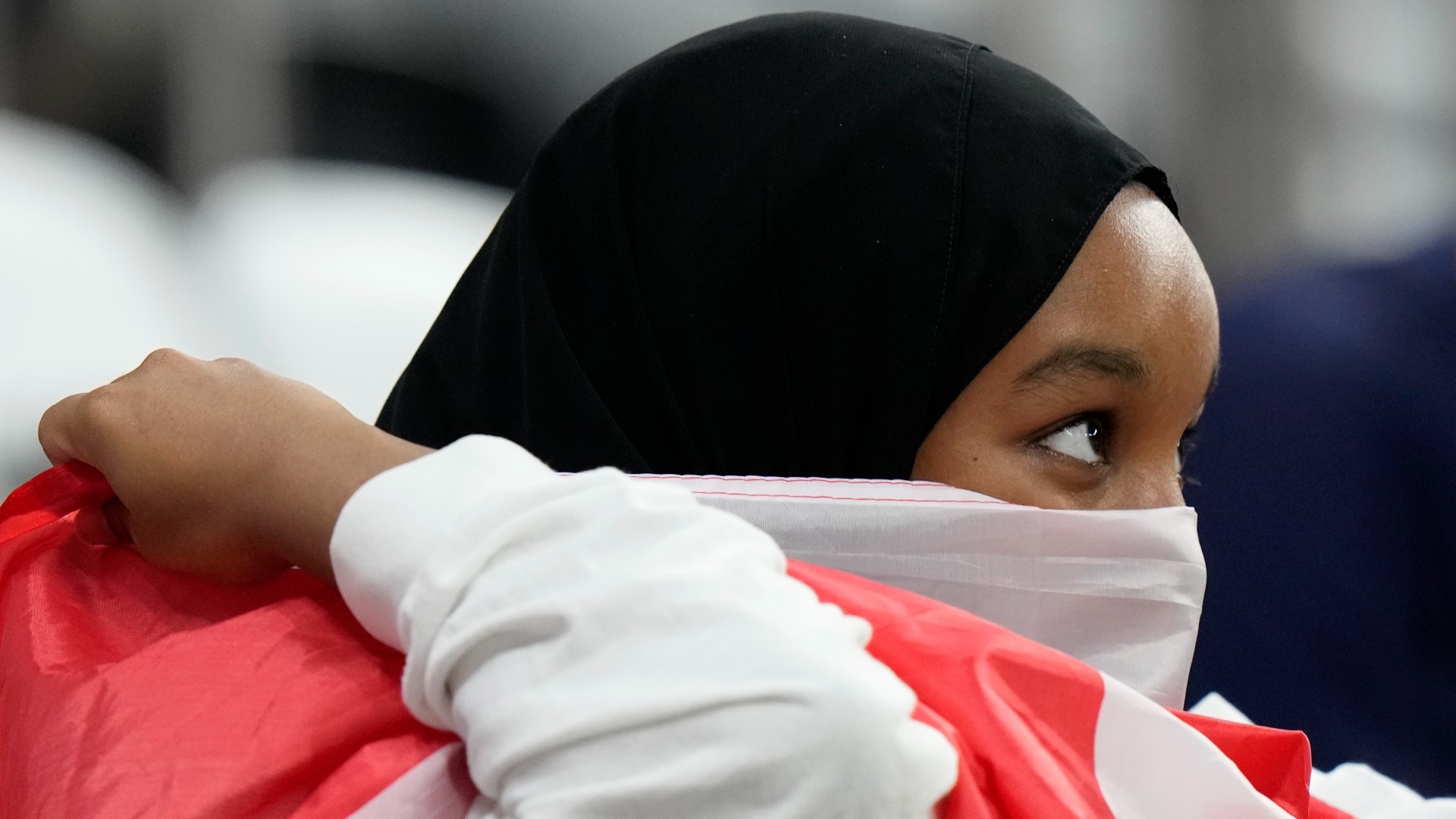
"It's coming home."
These iconic words are being chanted at bars, pubs, playgrounds and cafes all across England as the Three Lions aim to score big at the Qatar World Cup in Saturday's quarter final.
The words, which capture the dreams, memories, stress, pride and pain of England fans, feel like a rallying cry, as the nation looks to end 56 years of hurt and bring the trophy "home".
'The Moroccan team just resonates with me more on a cultural level'
- Mehdi Saif, British Moroccan
Late at night on the tube, there's normally a steady trickle of locals making their way home after a long day of work. Instead, there's now a steady stream of red and white - with some belting out the catchy Lightning Seeds' song at the top of their voice - a marker of football fever gripping the country.
St George's flags, England shirts; the colour and atmosphere is something to behold.
New MEE newsletter: Jerusalem Dispatch
Sign up to get the latest insights and analysis on Israel-Palestine, alongside Turkey Unpacked and other MEE newsletters
Despite the tournament being held thousands of miles away, England seems to have embraced the World Cup in Qatar.
But while the country as a whole may be rooting for Gareth Southgate's boys, there are several communities that have a myriad of reasons for not openly expressing their support for the Three Lions.
Several fans told Middle East Eye that while football is known as the beautiful game, minorities had often seen its ugly side on the terraces, most notably racism, misogyny and Islamophobia.
Abdulrahman Salih, who is of Iraqi and Irish heritage, said he had a difficult relationship when it came to supporting the England football team.
While ordinary English people fly the St George's flag on St George's Day, he said the flag had been co-opted by racist and right-wing groups who pushed an aggressive anti-immigrant agenda.
"I've never owned a St George's flag, or a Union Jack. That's not to say I don't have an affinity or a connection to this place or the people that often represent those flags. But I find it difficult to embrace big picture institutions that don't love me back," he told MEE.
He said the Euro 2020 tournament and the racist abuse young black players Bukayo Saka, Marcus Rashford and Jadon Sancho were subject to left a bitter taste in his mouth.
Before that tournament, when asked how he felt about the possibility of England winning, he would say: "I'd love it for the lads, but hate it for the nation."
'Fractured identity'
It's not just the players who are the target of racist abuse during matches; the fans are very much in the firing line too.
A YouGov study from 2021 revealed that a third of ethnic minority fans have directly experienced racism at football stadiums.
Arooj Khan, a doctoral researcher at the University of Birmingham, told MEE that while the England team was rich in diversity, she couldn't shrug off the racism her family was subject to while growing up near West Ham's former stadium Upton Park in east London.
'The racism I have experienced has left me with a fractured identity; one that yearns to belong purely for peace of mind and one that knows that belonging is out of reach'
- Arooj Khan
"It was traumatising and chronically stressful. We stayed in during match days. My dad had plenty of stories of him being beaten up upon leaving the house on match day," she said.
"The racism that I have experienced has left me with a fractured identity; one that yearns to belong purely for peace of mind and one that knows that belonging is out of reach."
Like Khan, other young British Muslims have grown up under the shadow of the "war on terror". Many have faced hostility and surveillance, mistrust and suspicion, questions about their Muslim faith and doubts over their loyalties.
According to a study by the University of Birmingham, Muslims are the second "least-liked" group in the UK, underscoring the shocking extent of Islamophobia in the country.
The study found that roughly one in four Britons hold negative views of Muslims and Islam - the highest of any group apart from Romani people (widely known by the exonym Gypsies) and Irish travellers.
Mehdi Saif, who was born and raised in West London to Moroccan heritage, said he would be supporting his parent's national team at the tournament but wouldn't go out of his way not to support England.
"The Moroccan team just resonates with me more on a cultural level," he said at a cafe on Portobello Road, in the London Borough of Kensington and Chelsea, which boasts one of the UK's largest Moroccan communities.
"During the Euros everyone was outside and supporting England. At times like these it's natural to be part of the crowd and celebrate the wins together. It gives you a proper community feeling."
For Matt Robinson, who is a white English convert, the Three Lions are the team of his heritage. "I'm an England fan because I'm English, you know, I was born in England."
In regards to the UK's grave colonial history, he said: "Obviously I didn't know Churchill starved three million Bengalis in 1943; you don’t study these things at school."
He references the 1943 Bengal famine in British India, in which the UK prioritised the distribution of vital supplies such as rice to the military, civil servants and other "priority classes".
Colonial legacy
Mohammed Saada, a British Palestinian based in London, said the UK's role in the partition of Palestine and the Balfour Declaration were primary reasons why he couldn't support the England team.
The Balfour Declaration was a pledge by Britain in 1917 to establish "a national home for the Jewish people" in Palestine. The statement came in the form of a letter from Britain’s then-foreign secretary, Arthur Balfour, to Lionel Walter Rothschild, a figurehead of the British Jewish community.
"The support for Zionism in this country is a reason that I can never support the England football team," he said.
For British Palestinians, the historical context and the actions of the two main political parties in stifling and silencing the Palestinian cause have triggered this lack of support for the England national team.
UK Prime Minister Rishi Sunak has personally recognised Jerusalem, which Palestinians see as their historic capital, as the capital city of Israel, while the leader of the opposition, Labour's Keir Starmer, has said he "supports Zionism without qualification".
Accompanying the perceived anti-Palestine bias is the failure to see British Muslim athletes break into the top tiers of domestic football and represent the national side.
In a recent online survey, 50 British Muslims were asked if they were able to name a single Muslim player who's represented England at international level.
Only two were mentioned, Easah Suliman and Hamza Choudhury, originally from Pakistan and Bangladesh/Grenada respectively. Both have not received a full cap and only featured at a youth level.
With growing antagonism towards refugees and economic migrants, embracing the children of immigrants as represented in the England squad for four weeks during the World Cup wasn't good enough, Saada said.
Middle East Eye delivers independent and unrivalled coverage and analysis of the Middle East, North Africa and beyond. To learn more about republishing this content and the associated fees, please fill out this form. More about MEE can be found here.



